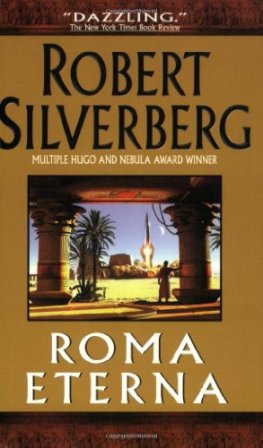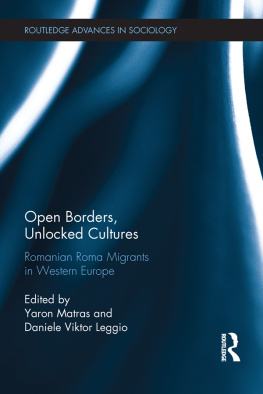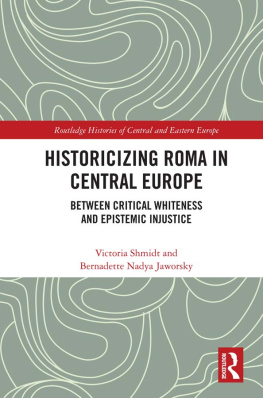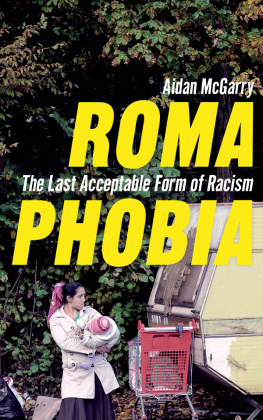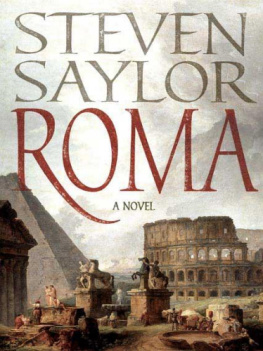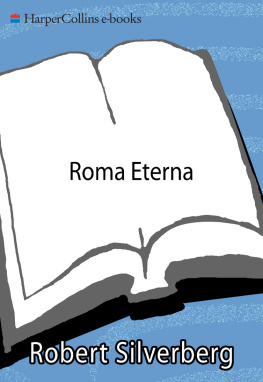European Social Integration and the Roma
Theoretically nuanced and empirically rich, this new study by sociologist Dr. Cerasela Voiculescu offers a unique and fresh insight on how power, in neoliberal times, is impacting on different Roma communities in Romania. Based on field observations, community work and academic reflection over nearly fifteen years, the project deftly deconstructs the Roma as both political projection and as non-static actors with strength, agency and their own power in challenging and disrupting gadzhe (non-Roma) institutions and the state. This is a remarkable book that strikes new ground in both Romani studies and critical accounts of neoliberalism and power.
Colin Clark, Professor of Sociology and Social Policy, University of the West of Scotland, UK
In the field of political sociology and European studies, there has long been a discussion on transnational neoliberal development and ethnic groups self-governance. Notwithstanding, there has been limited exploration in relation to modes of knowledge production associated with neoliberal governance of the Other (e.g. ethnic and indigenous groups), which capture its idiosyncratic modes of political expression and empowerment.
Drawing on Michel Foucaults political philosophy, this book discusses European social integration as transnational neoliberal governmentality and challenges its epistemologically constituted subaltern subject. Neoliberalism is questioned in relation to its programs of securitisation of poverty and authoritarian models of self-governance associated with instrumentality of the market. In this context, the books rich political historical ethnography develops a new framework for the study of social power. Furthermore, inspired by Jacques Rancieres radical philosophy, European Social Integration and the Roma proposes a new mode of knowledge production about populations excessively subjected to neoliberal governmentality, heralding the epistemological decolonisation of the neoliberal subject.
Presenting an insightful new prospect in critical sociology as well as the conceptualisation of power and the application of theories of governmentality, this book will appeal to scholars interested in the areas of political sociology and anthropology, international relations, social and political theory/philosophy and post-development studies.
Cerasela Voiculescu is an experienced researcher interested in critical social and political philosophy/theory with specific reference to social and political power, neoliberalism, knowledge, governmentality and European studies.
Routledge Advances in Sociology
For a full list of titles in this series, please visit www.routledge.com
183Origins of Inequality in Human Societies
Bernd Baldus
184Confronting the Challenges of Urbanization in China
Insights from social science perspectives
Edited by Zai Liang, Steven F. Messner, Youqin Huang and Cheng Chen
185Social Policy and Planning for the 21st Century
In search of the next great social transformation
Donald G. Reid
186Popular Music and Retro Culture in the Digital Era
Jean Hogarty
187Muslim Americans
Debating the notions of American and Un-American
Nahid Kabir
188Human Sciences and Human Interests
Integrating the social, economic, and evolutionary sciences
Mikael Klintman
189Algorithmic Cultures
Essays on meaning, performance and new technology
Edited by Robert Seyfert and Jonathan Roberge
190Becoming Anorexic
A sociological study
Muriel Darmon
191European Social Integration and the Roma
Questioning Neoliberal Governmentality
Cerasela Voiculescu
First published 2017
by Routledge
2 Park Square, Milton Park, Abingdon, Oxon OX14 4RN
and by Routledge
711 Third Avenue, New York, NY 10017
Routledge is an imprint of the Taylor & Francis Group, an informa business
2017 Cerasela Voiculescu
The right of Cerasela Voiculescu to be identified as author of this work has been asserted in accordance with sections 77 and 78 of the Copyright, Designs and Patents Act 1988.
All rights reserved. No part of this book may be reprinted or reproduced or utilised in any form or by any electronic, mechanical, or other means, now known or hereafter invented, including photocopying and recording, or in any information storage or retrieval system, without permission in writing from the publishers.
Trademark notice: Product or corporate names may be trademarks or registered trademarks, and are used only for identification and explanation without intent to infringe.
British Library Cataloguing in Publication Data
A catalogue record for this book is available from the British Library
Library of Congress Cataloging-in-Publication Data
Names: Voiculescu, Cerasela, author.
Title: European social integration and the Roma : questioning neoliberal
governmentality / Cerasela Voiculescu.
Description: Milton Park, Abingdon, Oxon : New York, NY : Routledge,
2017. | Series: Routledge advances in sociology ; 191 | Simultaneously
published in the USA and Canada by RoutledgeTitle page verso. |
Includes bibliographical references and index.
Identifiers: LCCN 2016022171 | ISBN 9781138898141 (hardback) |
ISBN 9781315708737 (ebook)
Subjects: LCSH: RomaniesEuropePolitics and government. |
RomaniesEuropeSocial conditions. | Social integrationEurope. |
NeoliberalismEurope. | Power (Social sciences)Europe. |
TransnationalismPolitical aspectsEurope. | EuropeEthnic
relationsPolitical aspects. | EuropePolitics and government1989
Classification: LCC DX145 .V64 2017 | DDC 305.8914/9704dc23
LC record available at https://lccn.loc.gov/2016022171
ISBN: 978-1-138-89814-1 (hbk)
ISBN: 978-1-315-70873-7 (ebk)
Typeset in Times New Roman
by Apex CoVantage, LLC
Politics is not the exercise of power. It is the political relationship that makes it possible to conceive the subject of politics ().
Jacques Ranciere
What is questioned is the way in which knowledge circulates and functions, its relations to power.
Michel Foucault
The relation between answer and question is essentially a power relation, hence political: relation of despotic master and slave up in arms.
It is never the answer, but the question that sets the building on fire.
Let this door be a flame.
Edmond Jabes


